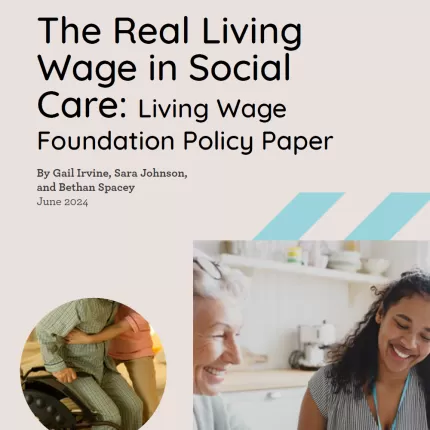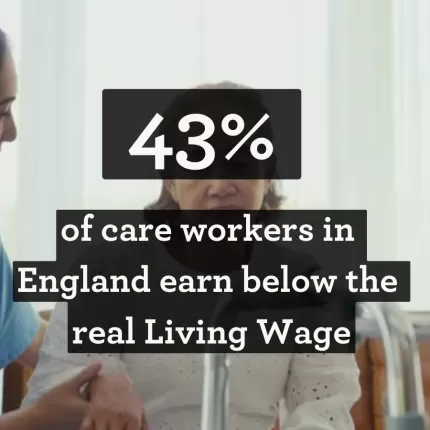The Real Living Wage in Social Care: Living Wage Foundation Policy Paper
This policy paper looks at the social care sector, a sector characterised by high numbers of jobs paying below the real Living Wage as well as insecure work. Public visibility of the contribution and low-paid nature of care work increased during the Covid-19 pandemic. Securing the real Living Wage for social care workers has been a priority for the Living Wage Foundation and our parent charity Citizens UK. The Living Wage Foundation has so far accredited 664 adult social care providers across the UK, resulting in 45,558 workers being paid a real Living Wage.
In this policy paper, we explore:
- How the local government funding is a key feature driving low pay in social care
- The negative impacts of low pay in social care and how the real Living Wage would mitigate these
- Policy recommendations and considerations for implementation
A summary of key points include:
- Social care workers do vital, skilled and demanding work but this is not reflected in their pay. 43% of adult social care workers in England are paid below the real Living Wage, while in London, 80% of adult social care workers earn less than the London Living Wage. Earning below the real Living Wage is linked to individuals experiencing deprivation and hardship.
- A key factor in social care workers’ low pay is constrained public funding for the delivery of care. The public sector, primarily local government, is the main commissioner of social care services, which tend to be delivered by private and third sector employers. Yet local government budgets have seen reductions in recent years, constraining wages in this sector.
- UK government has the power to change this. They can do this by making a policy commitment to the real Living Wage in the social care sector, and providing a funding uplift to enable payment of the real Living Wage for social care workers within the cost of care delivery. Due to similar devolved government interventions in Scotland and Wales, hundreds of thousands of social care workers in these jurisdictions already receive the real Living Wage as the minimum pay floor.
- We estimate that a wage uplift of £415 million would be needed to pay all social care workers in England the UK real Living Wage. This figure includes raising the wages of social care workers in London to the level of the higher London Living Wage. This policy would deliver direct benefits in terms of higher wages to around 400,0000 workers currently earning below the real Living Wage.
- UK Government would need to identify the most effective mechanisms to deliver this wage transfer through social care funding. They could build on learning for how this has been done in Scotland and in Wales. Assuming the uplift cost would be offset by government recouping additional income tax and national insurance through higher wages, the net cost of the wage uplift is estimated to be £330 million. This measure to support fair pay in the social care sector would amount to less than 2% of the social care budget for the coming year.
- The real Living Wage would contribute towards improved staff recruitment and retention in the social care sector, helping with the availability and quality of social care. In turn this would reduce pressures on the National Health Service (NHS), as fewer people would present to the NHS if appropriate social care was available. It would support people to stay well and also be discharged from hospital safely, particularly among the ageing population with complex care needs.
- Paying at least the real Living Wage in social care would bring both national and local economic benefits. Skills for Care estimates that for every £1 invested in social care, £1.75 would be generated in the wider economy. While Smith Institute research shows that if a quarter of low paid workers had their pay increased to the real Living Wage, the UK economy would grow by £1.7 billion.
- The real Living Wage is a vital foundation from which to tackle wider job quality issues within the social care sector, including insecure contracts and lack of pay progression. There would be value in establishing a social partnership process - comprised of employer, worker and government representatives – to embed at least the real Living Wage for all social care workers, and to agree sector-wide standards to provide better quality work.
SUMMARY OF RECOMMENDATIONS
UK Government to ensure all social care workers in England are paid at least the real Living Wage, building on the example set in Scotland and Wales.
- Secure at least the real Living Wage for every hour worked, including sleep-in shifts and in-work travel time.
- Start with publicly funded adult social care. Put in place sufficient funding, delivery mechanisms and requirements for the commissioners of social care to raise the wages of adult social care workers across the care they fund, including care funded by Direct Payments.
- Initiate a process with employers and workers’ representatives to ensure the whole social care sector is paid at least the real Living Wage – guaranteed through provider accreditation – and with a broader remit to improve workers' terms and conditions.




